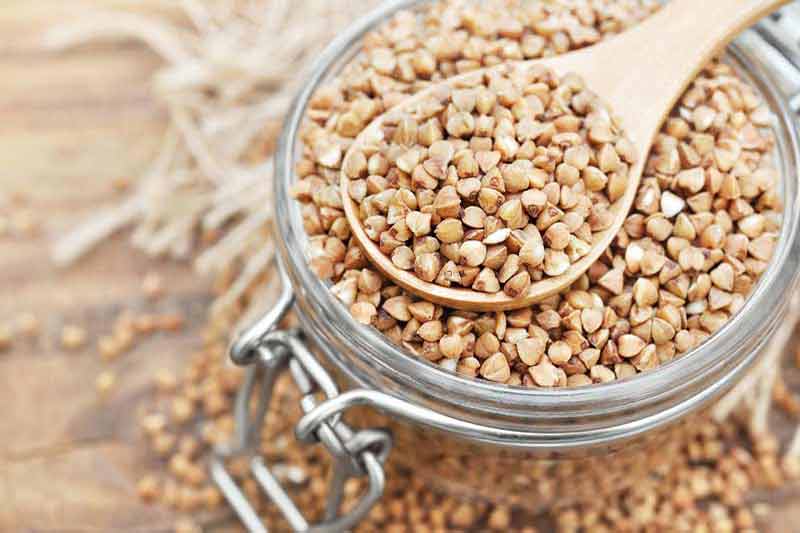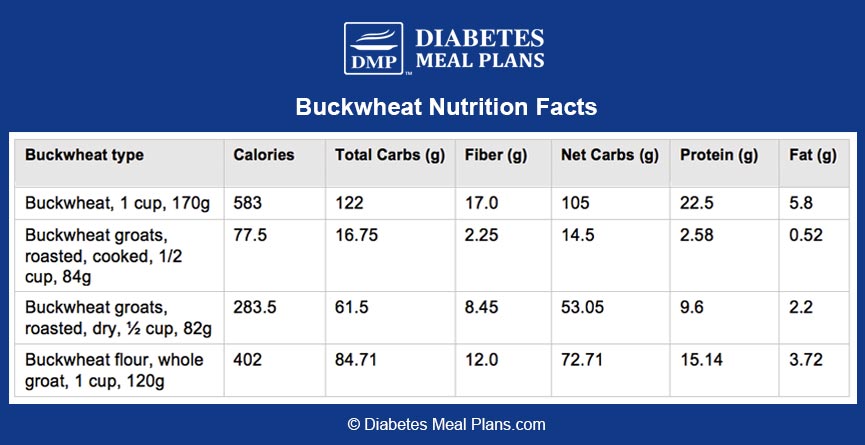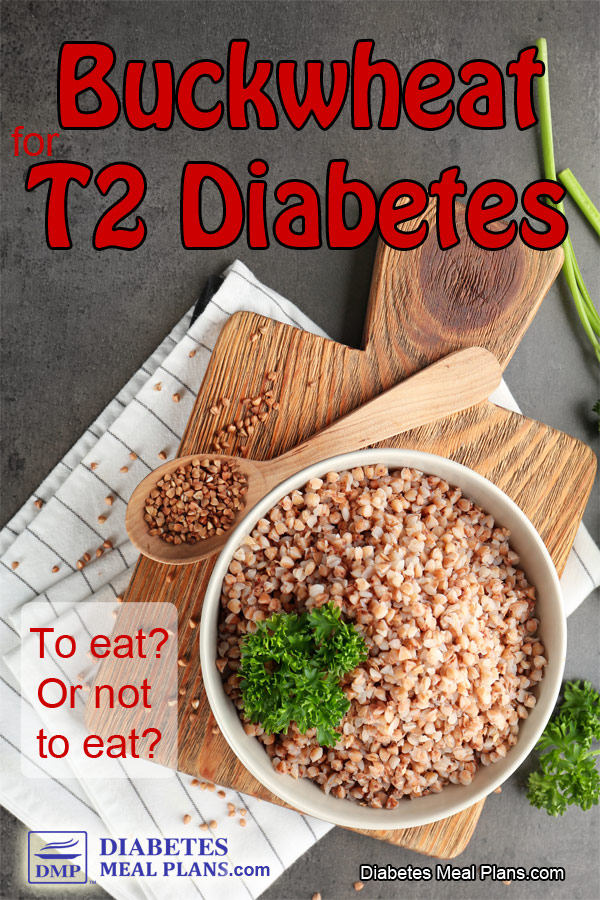Something that’s really annoying about information you might find around the web, is it’s not exactly accurate. This means you can find yourself thinking a food is good for blood sugar levels and diabetes, when it’s actually not.
Take buckwheat for diabetes as an example.
Recently one of our readers said: “Research has shown buckwheat can help lower blood sugar” – this is not exactly true.
So let’s delve a little deeper to learn more about buckwheat.

What is Buckwheat?
While buckwheat is thought to be a ‘grain’ it’s actually a fruit seed related to rhubarb and sorrel. Still, we do consider it a grain, and a gluten free one at that, which means it can be consumed by those with gluten and wheat sensitivities.
Buckwheat can be eaten as a whole grain. Buckwheat groats are the intact hulled seeds of buckwheat.
Flour can be made from its hulled seeds, leaves and flowers, which in turn can be used to make a variety of products like bread, pancakes, soba-noodles and gluten free pasta.
Buckwheat Nutrition Facts
Buckwheat is a whole grain and it does contain high levels of some nutrients, including magnesium, the flavonoids rutin and quercetin, and lysine. Compared to other grains it is also high in protein and fiber.
BUT… as you will soon see in the following nutrition chart, buckwheat is incredibly high in carbs!!

Cooking the buckwheat whole as groats clearly is the best way to eat it should you choose to, as it drastically reduces the carbohydrate content. Likewise, the glycemic index of buckwheat is ~49, which is low glycemic index. Groats can be used as a substitute for rice, if you choose to eat it (keep reading).
When buckwheat is processed into flour those carb counts add up, just like other whole grain flour-based foods. Likewise when buckwheat is processed to noodles, bread and pancake mix it changes the glycemic index score to 59, 67 and 102, respectively – medium and high glycemic index, which means blood sugar raises faster and higher.
Overall, because buckwheat is a higher carb food we generally do not encourage it in a low carb diet such as we recommend.
Yes it provides nutrients, but so do other foods that are more blood sugar-friendly.
While you can get fiber from whole grains, you can get more fiber from veggies, nuts and seeds, which are much better for blood sugar control. For example, one tablespoon of chia seeds contains more fiber (2 g) than 1/2 cup buckwheat (1.35 g).
You can obtain plenty of magnesium from other foods such as pumpkin seeds and leafy green vegetables.
So with all those carbs, this raises the question, is buckwheat really worth eating? Or does it lower blood sugar like people think?

Research on Buckwheat for Diabetes
A study involving participants with type 2 diabetes found that those who replaced a daily staple food with buckwheat experienced a decrease in fasting insulin. However, there were no significant differences in blood glucose or A1c levels. And something interesting was that a greater level of insulin resistance was observed when people ate more than 110g per day of buckwheat, which would be slightly more than 1/2 cup cooked. This study was also not conducted over a length of time so it is difficult to say whether this increased insulin resistance may occur with lower amounts.
The consumption of pseudocereals (quinoa and buckwheat) for breakfast in another study found that a 67 g buckwheat (less than 1/2 cup) meal achieved lower glucose levels at 60, 120, 180, and 210 minutes after the meal compared to a reference white wheat bread meal. It’s important to emphasize here that this is in comparison to white bread, which of course we would expect – a whole grain is always going to produce a lower blood glucose response compared to a processed grain. However, that does not mean it lowers blood sugar levels.
When you look at the statistics more closely, the people with diabetes still had levels higher than normal 2-hours post-meal 174 mg/dL (9.7 mmol/L). Ideally we’d want to see them below 140 mg/dL (7.8 mmol/L).
A study involving those with diabetes found that buckwheat bread intake versus a white-wheat bread mixture resulted in lower 2-hour post meal glucose levels. Samples of foods were provided in 50 g carbohydrate servings. As we just pointed out above, this is compared to white bread, which we would expect. This does not prove buckwheat is good for blood sugar, it just suggests it is better than white bread – obviously.
Stringer and associates compared the use of buckwheat flour products to rice flour products on post meal levels of glucose, insulin and gut hormones. There were no changes in glucose or insulin levels, and there was no change in fasting glucose levels in those with or without diabetes when buckwheat was consumed for one week. However, the consumption of buckwheat did alter levels in gut hormones that help control satiety (feeling of fullness). This again would be expected as whole grains contain more fiber and nutrients compared to other grains.
Compared to eating wheat, buckwheat product consumption has been shown to improve levels of total cholesterol, LDL cholesterol, triglycerides, glucose and insulin in those considered to be prediabetic.
So overall, the conclusion from the research is that eating buckwheat shows little benefit in TREATING type 2 diabetes.
We have discussed the difference between prevention and treatment before. While a food is obviously better than other food choices and even shown to prevent diabetes, that doesn’t mean it is a good food to treat diabetes if you already have it.
The American Diabetes Association state in their 2017 Standards of Medical Care in Diabetes, that:
“whole-grain consumption is not associated with improvements in glycemic control in type 2 diabetes.”
Or in other words, it doesn’t help you lower blood sugar and A1c – that’s what the research clearly shows in terms of type 2 diabetes treatment.
Buckwheat for Diabetes: What’s the verdict?
Buckwheat is a whole grain and it is a whole food.
Research shows whole grain consumption is associated with lower risk of type two diabetes – meaning it may help prevent the development of type 2 diabetes. It may also be okay for those with prediabetes.
Yes, it is going to be a better choice of grain when compared to white pasta and rice and even whole wheat.
But we know that the prevention of diabetes and the treatment of diabetes is going to be different when talking about dietary recommendations.
For people with type 2 diabetes buckwheat may be a better selection if you choose a whole grain now and then. But remember, like other whole grain foods, buckwheat is not a food we generally encourage people to eat because of it’s higher carb content.
Please share this info to help educate others – thanks!

Ida Greschner
How about read made with fermented buckwheat? Would the fermentation alter the carb content?
Dr Jedha - Nutritionist (PhD)
Hi Ida, Fermenting buckwheat to make bread does not significantly alter the total carbohydrate content of the buckwheat. There is some evidence that suggests that fermentation may reduce the glycemic index and increase resistant starch, but there isn’t any solid evidence to suggest this changes the impact of buckwheat on blood glucose. If you are consuming fermented buckwheat bread, the best way to test it’s effect for you is using a blood glucose monitor.
LYNN M MENDENHALL
Buckwheat is not a grain. it is a seed, from same family as rhubarb.
Emily - Dietitian (MS, RD)
You are correct. Nutritionally, it has more similarities to grain (ie. high carb) so we would encourage you to treat it like a grain should you choose to include in your diet sparingly.
Veeta
Thank you for the article.
Informative and easy to read.
MJ
This is America. You can get any food, as much as you want. There are so many different foods available that you can eat something different every day. All you have to do is make sure that food is whole and nutritious. And you can get any supplement. The main thing is knowing your personal needs, what your body needs.
My A1c was 10. My doctor wanted to give me Metformin. I said 👎 no. I got some manganese and some chromium. I don’t take these every day. I started to pay attention to how many grams of sugar I consumed in a day. I aim for 25 but often go over; just pay attention, not too far over. I found sugar free things at the store. I found other things to sweeten my food with. I have about 5 different foods for this, 3 of which contain no sugar at all. At last check, my A1c was 5.8.
MJ
And I LOVE buckwheat ramen with oatmilk butter and a variety of ground nuts and chia seed mixed in. God bless America.
elena
Hi MJ – how long did it take for you to go from 10 to 5.8?
Dr Jedha - Nutritionist (PhD)
Elena, many people can get from 10 to 6 in 4 months (for example John in our T2Diet Program went down 3% in 4 months, or David went down 4% in that time), some people take much longer, it can depend on many factors. It is possible though, naturally with nutrition and lifestyle. Are your levels high at the moment?
Matt
What about type 1 diabetes?
Jedha: Nutritionist (MNutr)
We specialize in research and information in type 2 and prediabetes.
Mike Jackson
Agh! That’s annoying. I was hoping to make Breton galettes with low carb/keto ingredients, and as I used to make these, I was always under the (sadly) mis-apprehension it was good as a flour. Oh well, not to be!
Brianna
Try almond flour or coconut flour
Gregory Besek
Thank you for this information, it is helpful. However, I have loved buckwheat pancakes for over 50 years but only ate them once in a blue moon as nobody else I know can stand them a. I eat pancakes rarely anyway but now that I am semi retired, I would like to eat them on occasion again. What brands are the best for someone like me who has an A1c of 63. Also, any feedback?
Thank you for your time
GB
Emily - Dietitian (MS, RD)
The brand won’t make a big difference nutritionally – so, if you’re choosing to have buckwheat pancakes as a treat, pick one that you enjoy and make sure to stick to a reasonable portion (maybe even cut the portion in half) for best blood sugar results. It may also be beneficial to pair your pancakes with some additional protein and fat (ie. eggs, cheese, meat, nuts) to help mitigate blood sugar spikes.
Arnie
Does sprouting buckwheat reduce carbs?
Emily - Dietitian (MS, RD)
To my knowledge, it does not lower the carbohydrate count. Sprouting helps with the overall nutrient content and makes it a bit easier for your body to absorb the nutrients.